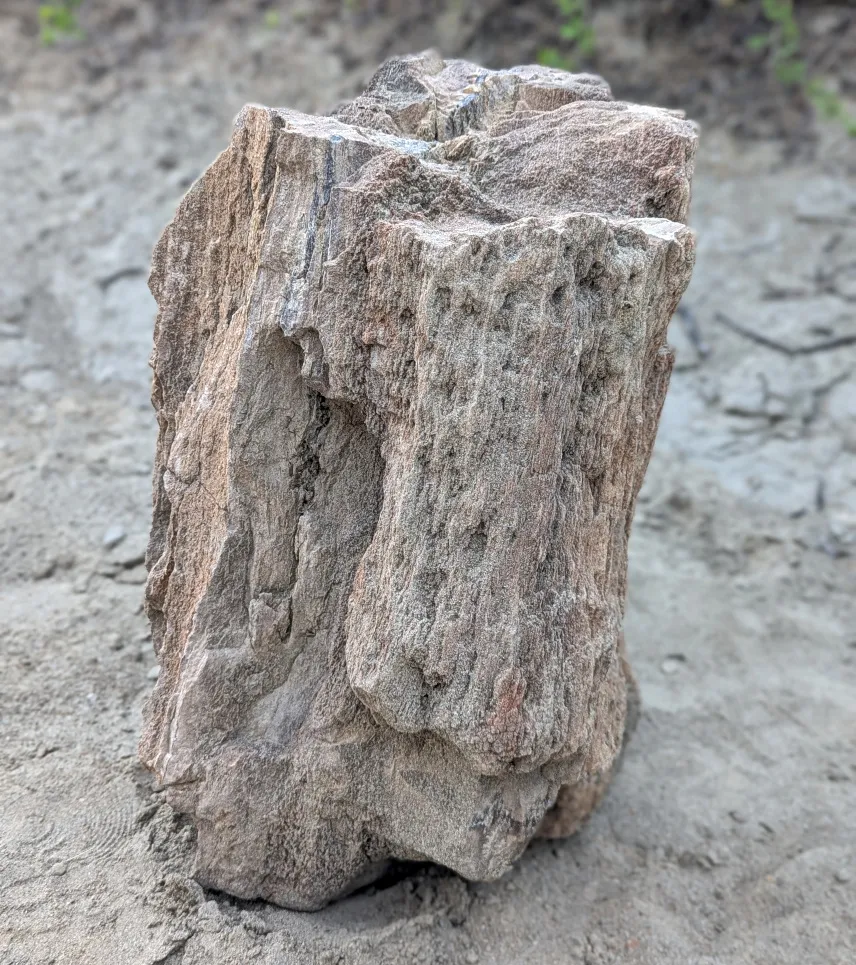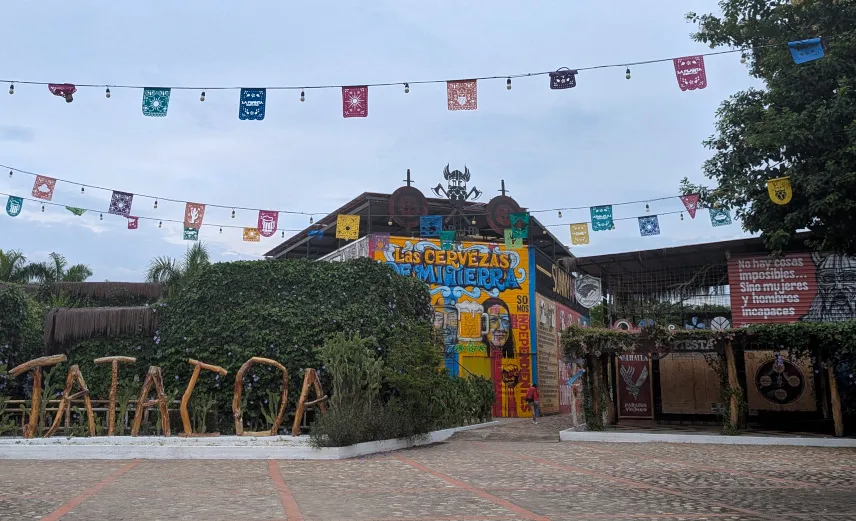
Travel Guide to Villavieja and the Tatacoa Desert (+ Map)
TL;DR
Think Villavieja is just a gateway to the Tatacoa Desert? Our Villavieja travel guide proves it’s a destination in its own right – with museums, river tours, and ice-cold beers when you need them most.
Looking to explore more than just the usual Tatacoa Desert stops? You're in the right place.
You’re probably wondering if Villavieja is worth a stop, how to get there, and what else there is to do beyond the desert.
Most guides only talk about the desert and barely mention the town itself. We’ve been there, sorted the buses, crossed the river, hiked the trails, and found the best local spots – so you don’t have to guess.
This travel guide is for independent travellers, fossil lovers, slow explorers, and anyone who appreciates off-the-radar gems.
We’ve done the legwork, sweated through the hikes, and even found cold beers and a pool when it counted. You’ll find real, honest tips here – zero fluff.
So yes, Villavieja is absolutely worth visiting – for the science, scenery, and slower pace. Let’s dive in.
Villavieja Travel Guide
Villavieja Colombia Map
Is Villavieja Worth Visiting?
Most travel guides focus almost exclusively on the nearby Tatacoa Desert, but Villavieja is an interesting destination in its own right – and definitely worth visiting. Especially if you're fascinated by palaeontology, Villavieja is a real mecca. There’s a small palaeontology museum in Villavieja but the natural history museum in La Victoria is the real deal for aficionados. As you can see, this small town in Colombia’s Huila department offers more than just a launching point for desert excursions.
Speaking of the desert, it’s worth noting that the Tatacoa isn’t technically a desert at all. It’s classified as a tropical dry forest, with unique flora, fauna, and striking eroded landscapes that resemble something from another planet. While the Tatacoa’s red and grey canyons are the main draw for photographers and stargazers, Villavieja itself offers a slower, more authentic experience of local culture, history, and scientific discovery.
In short, if you're heading to Tatacoa, don’t just pass through Villavieja – take the time to explore it. You'll be glad you did.
How to Get to Villavieja
Via Aipe
Coming from the north (Salento, Bogota), you’ll save a lot of time by going to Aipe instead of Neiva if you and your luggage can fit onto a moto-taxi (here’s the WhatsApp number of Rocio, our moto-taxi driver in Aipe, in case you need it: +57 3114903507). In Aipe, you can take the small ferry to Villavieja.
Make sure to leave early as the last ferry from Aipe to Villavieja leaves at around 6 pm.

Salento to Villavieja
The route from Salento to Villavieja is somewhat complicated, but we managed to complete it in one day.
- Take the bus from the bus station in Salento to the bus station in Armenia. The bus leaves roughly every 40 minutes during the daylight hours. The journey takes around one hour.
- Take the bus from Armenia to Aipe. Buses leave super regularly throughout the day and take around 6 hours, potentially longer.
- Take a moto-taxi to the small ferry that crosses directly from Aipe to Villaviaja.
Here’s our full Salento travel guide:
Bogota to Villavieja
Buses from Bogota to Aipe leave super regularly throughout the day and take around 6 hours, potentially longer.
In Aipe, you can hop on a moto-taxi and take the small ferry to Villavieja (see above).
Via Neiva
Coming from the south (San Agustin, Cali, Popayan), you first have to reach Neiva.
In Neiva, you can catch a minivan. They run until 7 pm and the ride takes around 1 hour.

San Agustin to Villavieja
Buses from San Agustin to Neiva run several times a day. The bus takes around 6 hours.
Cali to Villavieja
The bus from Cali to Neiva leaves several times per day and takes around 11 hours. Your best bet if you don’t want to spend a night in Neiva is catching a night bus.
Popayan to Villavieja
If you want to cut the bus time from Cali short or avoid taking a night bus, we recommend stopping in Popayan. Buses from Popayan to Neiva leave several times per day and take around 7 hours.
Here’s our full Popayan travel guide:
How to Get Around Villavieja
The town centre of Villavieja itself is walkable.
You have two options to visit the Tatacoa Desert:
- Take a tuk-tuk. Drivers are waiting at the main square in Villavieja.
- Go on a guided tour.
We opted for this Guided Day Trip to the Tatacoa Desert with Lunch. Here’s our full review of this tour:
Where We Stayed in Villavieja
You have two options: you can either stay in the desert or in town. We opted to stay in Villavieja as the distance to the desert is not far and we were craving more infrastructure with internet as well as shop and restaurant options.
We chose Luna del Desierto and couldn’t recommend it more highly. The owners are lovely, the rooms comfy, and the kitchen is clean and well equipped – the free drinking water is much needed in the desert heat. You might even meet the tiny dog, Luna.

10 Things to Do in Villavieja
1. Boat Tour on Rio Magdalena
The Magdalena River is the main river of Colombia, flowing northward about 1528 kilometres (949 mi) through the western half of the country. Don’t miss going on a boat tour! You can spot animals like birds, turtles, and lizards.
Brave souls are even able to swim in the river.

2. Villavieja Main Park
While it won’t take your breath away, the main park of Villavieja shouldn’t be missed when in town.
Of course, our highlight was the replica of a giant ground sloth, an extinct species of sloth that really was this big. You can also find the main church of Villavieja as well as the beautiful Capilla de Santa Barbara, the oldest chapel in the entire department of Huila, around the main park.

3. Palaeontological Museum
The Palaeontological Museum of Villavieja is also located in the main park. It’s a small museum that belongs on every visitor’s itinerary.
The museum features three main halls, each dedicated to a theme – Mammals, Reptiles, and Environment – offering a comprehensive look at Villavieja’s palaeontological, historical, and cultural heritage.

4. Walk Around Villavieja
Again, Villavieja will probably not blow you away, but there are some hidden gems to discover if you’re open to it. Look for street art and statues, maybe visit the Casa Museo del Totumo, and don’t forget to make your way to the riverfront of Rio Magdalena.

5. The Red Desert
No travel guide to Villavieja would be complete without mentioning the sights of the Tatacoa Desert itself so here they are:
El Cuzco, also known as the Red Desert, feels like another planet with its vivid red formations shaped by millions of years of erosion. The striking colour comes from iron-rich soil, and the terrain forms a maze of canyons, ridges, and spires.
The walk through El Cusco takes about 30 minutes to an hour, depending on your pace. In the end, the viewpoint Mirador El Cuzco offers panoramic views.

6. The Grey Desert
Los Hoyos, or the Grey Desert, is known for its striking grey formations caused by volcanic ash. While the Red Desert often gets more attention, we believe both landscapes are unique and worth visiting.
A 30-minute to 1-hour hike takes you through winding trails and lunar-like terrain. Along the way, you'll enjoy panoramic views of this surreal landscape.

7. Valle de los Xilopalos
Another hike in the Tatacoa Desert leads through Valle de los Xilópalos, the most remote of the three and starts from a scenic viewpoint. While its rock formations aren’t as dramatic as those in the Red or Grey Desert, the trail features narrow gorges that give it a unique charm.
Fewer tourists venture here, so you might even have the place to yourself. The hike takes about 1-2 hours and offers a peaceful way to experience the desert’s quieter side.
By the way: Keep your eyes open for Xilópalos or fossilized wood. It forms when trees are buried under mud, sand, or volcanic ash before they can decay. Over time, water carries minerals into the wood’s empty cells. After millions of years, the organic material is replaced entirely by stone – preserving the shape and structure as solid rock.

8. Stargazing
The Tatacoa Desert is an ideal place for stargazing, thanks to its clear skies and minimal light pollution. Observatories offer guided experiences that include telescope viewing and explanations of the night sky while you relax on a mat beneath the stars.
We went to Observatorio Astronómico Astrosur which is located within the desert itself. While the conditions are excellent, note that tours here are only offered in Spanish.

9. Swimming Pool
To be honest, we were super reluctant to use a swimming pool in the desert at first. After being in the desert, we were so hot that we threw all of our doubts overboard and jumped into the cool water.
We chose the pool at Manantial Tatacoa as a less touristy alternative to Los Hoyos and were not disappointed – we were the only people there.

10. Museo De Historia Natural De La Tatacoa in La Victoria
The collection of the Museo De Historia Natural De La Tatacoa in La Victoria consists of over 1700 fossils – mammals, reptiles, fish, birds, and petrified wood – that have been found in areas near the town centre of La Victoria. It’s a must-visit for travellers who are interested in palaeontology.
It’s an active research museum that works with scientists from around the world to preserve and share this rich fossil heritage, helping others learn about Earth’s prehistoric past and the importance of protecting it.
To get there, you can hire transport from the main park in Villavieja.
Where to Eat in Villavieja
The one place in town you shouldn’t miss is La Planta Brew Pub. They serve food and craft beer, have loads of cool art and decor, and there’s even a shop on site. For a small fee, you can use their swimming pool.

How Many Days in Villavieja Do You Need
If you’re short in time, one day is enough to see the highlights of Villavieja and the Tatacoa desert – especially if you opt for a day trip.
If you have more time, we strongly recommend staying a second day and visiting the Museo De Historia Natural De La Tatacoa in La Victoria.
Villavieja Tips
ATMs in Villavieja
There is one ATM in town. The fees are high and it does run out of money from time to time so bring enough cash. Expect not to be able to pay by card in Villavieja!
Supermarkets in Villavieja
There are enough small shops in Villavieja so you don’t need to go hungry.
Internet in Villavieja
The WiFi in our accommodation worked fine. We had no problems with our local SIM card in Villavieja itself but our connection got a bit patchy out in the desert. We recommend that you be prepared and bring an offline map.
Is Villavieja Safe
Villavieja is tiny and feels very safe. There’s also not a ton (read no) nightlife so there’s not really a reason to be out and about late.
We heard a lot of horror stories of people getting lost in the desert. After having visited ourselves, we must say that the desert areas are so small that it will be seriously hard to lose your way if you’re not extremely careless.
This post contains affiliate links. If you use these links to buy something we may earn a commission. You would help us a lot if you do so. Thanks.




